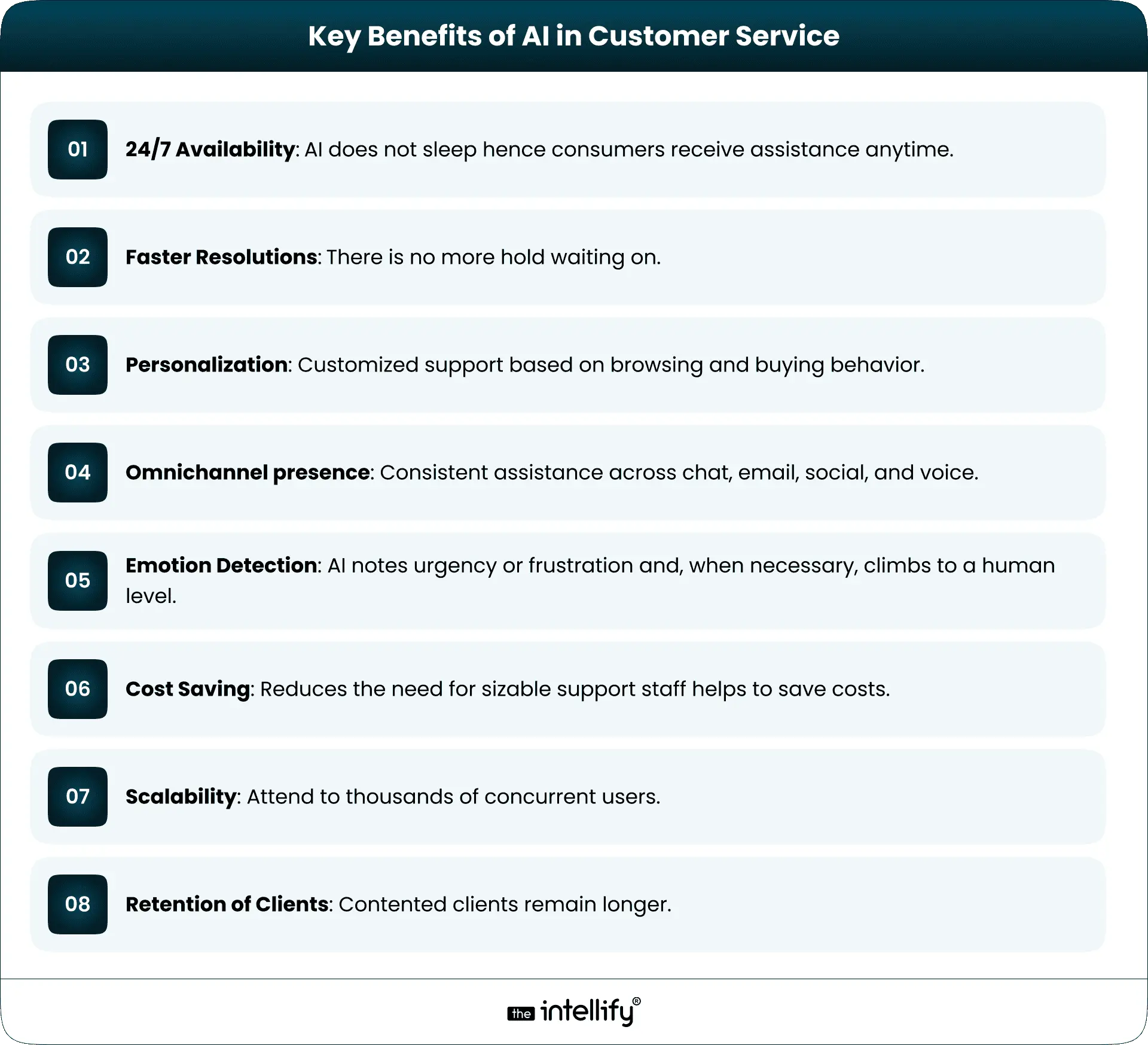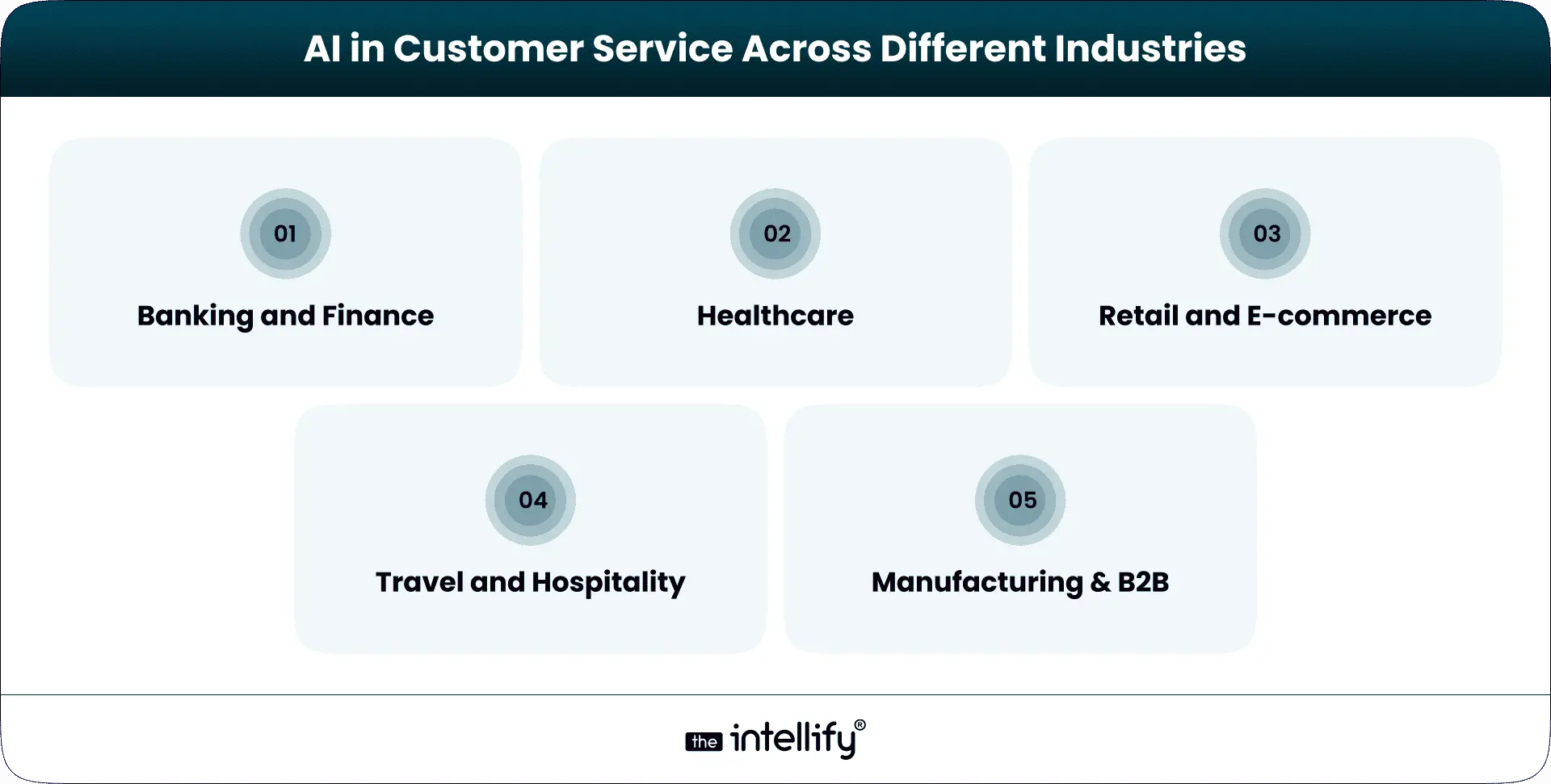New Era for Customer Service
Customer service is changing greatly. Smart, AI-driven systems that operate 24/7, better understand consumers, and handle problems faster are replacing traditional contact centers and support requests. Companies now ask, “How can AI help us serve customers better, faster, and smarter?” rather than merely “How can we serve customers?”
In this blog, we’ll explore the future of Ai in customer service, focusing on three main technologies: Conversational AI, Generative AI, and Agentic AI. We will also discuss the advantages of artificial intelligence as it is being applied across several sectors.
What Is the Future of AI in Customer Service?
The future of customer service will be sophisticated, predictive, and quite individual. It’s about enabling support teams and smoothing out customer interactions, not about substituting people.
Imagine a time when artificial intelligence forecasts a customer’s problem before they ever interact, provides self-service solutions, and only escalates to a human when absolutely necessary. With artificial intelligence increasingly driving customer care automation, proactive issue resolution, and 24/7 worldwide support, we are headed toward that future.
The Three Game-Changers in AI Customer Service
A. Conversational AI: Human-like interactions at scale
Virtual agents and chatbots powered by conversational AI mimic actual human interactions. Unlike earlier written bots, these systems grow with every contact.
- Natural language processing (NLP) helps one to grasp user intent.
- React right away using text or voice.
- Address questions, order status, returns, and more.
This lets companies give continuous support over websites, WhatsApp, Messenger, and mobile apps.
Example:
- Bank of America’s Erica is a well-known AI customer service assistant that helps customers manage finances, check balances, and even suggest money-saving tips.
- Camping World used Conversational AI to cut customer wait times in half during high-demand seasons.
Why it matters: Conversational artificial intelligence responds swiftly, consistently, and helpfully to thousands of people at once.
B. Generative AI: Contextual-aware, tailored assistance
Using cutting-edge models like GPT, generative AI generates human-like responses, draft emails, summarizes data, and even forecasts user demands moving forward.
Applications of use:
- email responses automatically generated
- Compiling center article summaries
- Offering tailored advice on personal support
Without sacrificing accuracy, it gives routine customer service chores originality and inventiveness.
Example:
United Airlines uses Generative AI to power its virtual assistant, helping customers with real-time flight updates, baggage issues, and more, without a human agent.
Why it matters: It provides deeper, context-aware conversations and reduces the burden on human agents.
C. Agentic AI: Wise decision-makers for consumer experience
Agentic AI advances still another level. It does not only speaks. These systems can even manage complete processes without human involvement, make judgments, and automate chores.
Applications of use:
- Directing tickets to the correct division
- Order cancelling or modification
- Solving recognized problems ahead of time
Example:
Verizon handles approximately 40% of its support inquiries with Agentic AI without human intervention. These artificial intelligence assistants can reject calls, provide intelligent recommendations, and even start refund or troubleshooting processes.
Why it matters: Agentic AI boosts efficiency and customer satisfaction by taking immediate action.

Actual Case Studies of AI-Driven Customer Service
1. Verizon: Smart Call Deflection
Through self-service channels, Verizon routes and fixes problems using artificial intelligence in customer care. Their virtual assistant can now manage over 20 million interactions a month without human intervention, therefore dramatically lowering call centre volume.
2. In-house Bank: Using artificial intelligence to raise NPS
Using bots driven by artificial intelligence, ING customized communications and shortened email response times. As so? Customer satisfaction and Net Promoter Score (NPS) clearly have increased.
3. United Airlines: Real-Time Travel Support
To make air travel more predictable and less stressful, United Airlines developed an artificial intelligence-powered virtual assistant to assist consumers with flight modifications, baggage updates, and airport directions.
4. Improving Digital Engagement: Camping World
After including artificial intelligence chatbots that quickly assist guests with product information, store locations, and service appointments, Camping World cut chat abandonment by 40%.
These illustrations explain how customer service and artificial intelligence working together produce savings as well as satisfaction.
Infographic: Comparing AI Types in Customer Service
| AI Type | Strengths | Use Cases |
|---|---|---|
| Conversational AI | Fast, Natural Conversations | Chatbots, Voice Bots |
| Generative AI | Context-Aware, Personalized Texts | Smart Replies, Summaries, Support Content |
| Agentic AI | Action-Oriented, Autonomous Tasks | Ticket Routing, Issue Resolution, Automation |
Use Cases: AI Across Industries
Customer service artificial intelligence goes beyond retail or technology. It’s altering the way support functions in many spheres:

1. Banking and Financial Services
- Use case: Instant KYC verification, fraud detection, AI-powered chatbots enabling users to check accounts, make payments, or seek loans.
- Result: Less wait times, more trust, and better onboarding follow from this.
2. Healthcare
- Use case: Appointment scheduling, symptom checking via chatbots, and post-discharge virtual assistants.
- Result: Improved patient experience and less strain on human staff follow from this.
3. Retail and E-Commerce
- Use case: Real-time inventory checks, tailored shopping help, AI-driven product recommendations.
- Result: Higher conversions and improved loyalty.
4. Hospitality and Travel
- Use case: real-time flight updates, Loyalty point management, booking changes, and multilingual help.
- Result: Reduced call center volume and better traveler experiences.
5. Manufacturing & B2B
- Supplier queries and support tickets handled via AI
- Self-service for equipment manuals and troubleshooting
Faster resolutions, reduced costs, and happier consumers, all of which are apparent advantages of AI in customer service across all three sectors.
You Can Also Read This Blog – How Voice AI Agents Are Changing Customer Service in 2025
Challenges & Considerations
While the future of AI in customer service is promising, businesses must keep a few things in mind:
- Data Security & Compliance: Especially important in healthcare, finance, and government sectors.
- Over-automation: Customers can get frustrated if they’re unable to reach a human when needed.
- Bias in AI models: If trained on poor data, AI can misunderstand or misrepresent customers.
- Integration Issues: AI systems must connect seamlessly with existing CRMs and backend tools.
- Training & Accuracy: Poorly trained AI can harm the experience.
- Cultural Sensitivity: AI should understand local language and tone.
The Future of AI in Customer Service: What’s Next?

The future of AI in customer service will see AI doing more than reacting, it will become proactive and predictive.
- consumer requirements before they become apparent.
- Integrate deeply with CRM systems.
- voice-first interactions
- Automate complex workflows
- Improve through continuous learning
- Get more emotionally intelligent.
The aim of artificial intelligence is not to replace humans but rather to enable them to perform their jobs better and let them concentrate on what counts most: empathy and sophisticated thought.
Choosing the Right AI for Your Business
Every company needs a different kind of artificial intelligence. Here is how one should decide:
- Conversational AI If your clients need fast responses, consider.
- Generative AI for dynamic FAQs or material-heavy help.
- Agentic AI for judgments and action automation.
Brief checklist:
- List three of your main support difficulties.
- Select the AI type that addresses those first
- Start small, then scale progressively.
- Partner with an experienced AI service provider
Why Choose The Intellify for AI-Powered Customer Service?
Here at The Intellify, we enable companies to fully use AI across customer support and experience.
From creating conversational AI chatbots to implementing agentic AI systems for automation, we provide scalable, safe, and simple-to-interface unique solutions.
We ensure:
- Perfect interaction with your current systems
- artificial intelligence acquired from actual interactions
- Constant development and real-time statistics
Conclusion: The Time to Embrace AI Is Now
The days of scripted support calls and protracted waiting lines are vanishing. Faster, smarter, more personal approaches to help consumers are being produced by artificial intelligence. The change is the new benchmark rather than a trend.
Whether your industry is retail, finance, travel, or healthcare, adopting the future of artificial intelligence in customer service will change your interaction with consumers.



